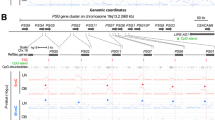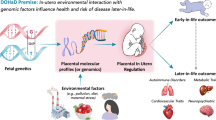Abstract
The importance of diet in health and disease has been well characterized in the past decades. Although the earlier focus of diet research was in the context of undernutrition and the importance of adequate nutrient intake to prevent malnutrition, in the current era of epidemic obesity the focus of our efforts has evolved toward understanding the effects of excess caloric intake. The current surge in childhood obesity rates suggests a correlation of maternal metabolic syndrome and obesity with programming of the fetal epigenome for metabolic diseases later in life. Alterations of the fetal genome, epigenome and metabolome have been well documented in cases of maternal malnutrition, including both overnutrition and undernutrition. It is of great interest and importance to understand how these divergent maternal factors regulate/program the fetus for metabolic diseases, and we and others have observed that epigenetic modifications to the fetal and placental epigenome accompany these reprogramming events. The following review summarizes recent studies on the effects of maternal diet and obesity on fetal epigenetics contributing to adult diseases later in life by taking advantage of state-of-the-art genomic, epigenomic and metagenomic techniques in nonhuman primate model systems.
This is a preview of subscription content, access via your institution
Access options
Subscribe to this journal
We are sorry, but there is no personal subscription option available for your country.
Buy this article
- Purchase on Springer Link
- Instant access to full article PDF
Prices may be subject to local taxes which are calculated during checkout

Similar content being viewed by others
References
World Health Organization. Obesity and Overweight [Online], Fact sheet no. 311, updated March 2011, http://www.who.int/mediacentre/factsheets/fs311/en/index.html.
Paneth N, Susser M . Early origin of coronary heart disease (the ‘Barker hypothesis’). BMJ 1995; 310: 411–412.
Barker DJP . The malnourished baby and infant. Br Med Bull 2001; 60: 69–88.
de Rooij S, Painter R, Roseboom T, Phillips D, Osmond C, Barker D et al. Glucose tolerance at age 58 and the decline of glucose tolerance in comparison with age 50 in people prenatally exposed to the Dutch famine. Diabetologia 2006; 49: 637–643.
Lumey L, Stein AD, Kahn HS, Romijn J . Lipid profiles in middle-aged men and women after famine exposure during gestation: the Dutch Hunger Winter Families Study. Am J Clin Nutr 2009; 89: 1737–1743.
Ravelli AC, van der Meulen JH, Michels RP, Osmond C, Barker DJ, Hales CN et al. Glucose tolerance in adults after prenatal exposure to famine. Lancet 1998; 351: 173–177.
Roseboom TJ, Van der Meulen JHP, Osmond C, Barker DJP, Ravelli ACJ, Bleker OP . Plasma lipid profiles in adults after prenatal exposure to the Dutch famine. Am J Clin Nutr 2000; 72: 1101–1106.
Roseboom TJ, Van der Meulen JHP, Osmond C, Barker DJP, Ravelli ACJ, Schroeder-Tanka JM et al. Coronary heart disease after prenatal exposure to the Dutch famine, 1944-45. Heart 2000; 84: 595–598.
Roseboom TJ, Van Der Meulen JHP, Ravelli ACJ, Osmond C, Barker DJP, Bleker OP . Plasma fibrinogen and factor VII concentrations in adults after prenatal exposure to famine. Br J Haematol 2000; 111: 112–117.
Hult M, Tornhammar P, Ueda P, Chima C, Edstedt Bonamy A-K, Ozumba B et al. Hypertension, diabetes and overweight: looming legacies of the Biafran famine. PLoS One 2010; 5: e13582.
Langley SC, Jackson AA . Increased systolic blood pressure in adult rats induced by fetal exposure to maternal low protein diets. Clin Sci 1994; 86: 217–222; discussion 121.
Langley-Evans SC, Phillips GJ, Benediktsson R, Gardner DS, Edwards CR, Jackson AA et al. Protein intake in pregnancy, placental glucocorticoid metabolism and the programming of hypertension in the rat. Placenta 1996; 17: 169–172.
Joss-Moore LA, Wang Y, Campbell MS, Moore B, Yu X, Callaway CW et al. Uteroplacental insufficiency increases visceral adiposity and visceral adipose PPARγ2 expression in male rat offspring prior to the onset of obesity. Early Hum Dev 2010; 86: 179–185.
MacLennan NK, James SJ, Melnyk S, Piroozi A, Jernigan S, Hsu JL et al. Uteroplacental insufficiency alters DNA methylation, one-carbon metabolism, and histone acetylation in IUGR rats. Physiol Genomics 2004; 18: 43–50.
Crozier SR, Inskip HM, Godfrey KM, Cooper C, Harvey NC, Cole ZA et al. Weight gain in pregnancy and childhood body composition: findings from the Southampton Women's Survey. Am J Clin Nutr 2010; 91: 1745–1751.
Crozier SR, Robinson SM, Borland SE, Inskip HM . Dietary patterns in the Southampton Women's Survey. Eur J Clin Nutr 2006; 60: 1391–1399.
Strakovsky RS, Zhang X, Zhou D, Pan YX . Gestational high fat diet programs hepatic phosphoenolpyruvate carboxykinase gene expression and histone modification in neonatal offspring rats. J Physiol 2011; 589: 2707–2717.
Lillycrop KA, Burdge GC . Epigenetic changes in early life and future risk of obesity. Int J Obes (Lond) 2011; 35: 72–83.
Lillycrop KA . Effect of maternal diet on the epigenome: implications for human metabolic disease. Proc Nutr Soc 2011; 70: 64–72.
Cox J, Williams S, Grove K, Lane RH, Aagaard-Tillery KM . A maternal high-fat diet is accompanied by alterations in the fetal primate metabolome. Am J Obstet Gynecol 2009; 201: 281.e1–281.e9.
McCurdy CE, Bishop JM, Williams SM, Grayson BE, Smith MS, Friedman JE et al. Maternal high-fat diet triggers lipotoxicity in the fetal livers of nonhuman primates. J Clin Invest 2009; 119: 323–335.
Legler J, Hamers T, van Eck van der Sluijs-van de Bor M, Schoeters G, van der Ven L, Eggesbo M et al. The OBELIX project: early life exposure to endocrine disruptors and obesity. Am J Clin Nutr 2011; 94: 1933S–1938S.
Milagro FI, Campion J, Garcia-Diaz DF, Goyenechea E, Paternain L, Martinez JA . High fat diet-induced obesity modifies the methylation pattern of leptin promoter in rats. J Physiol Biochem 2009; 65: 1–9.
West NA, Crume TL, Maligie MA, Dabelea D . Cardiovascular risk factors in children exposed to maternal diabetes in utero. Diabetologia 2011; 54: 504–507.
Fernandez-Morera JL, Rodriguez-Rodero S, Menendez-Torre E, Fraga MF . The possible role of epigenetics in gestational diabetes: cause, consequence, or both. Obstet Gynecol Int 2010; 2010: 605163.
Raaum RL, Sterner KN, Noviello CM, Stewart CB, Disotell TR . Catarrhine primate divergence dates estimated from complete mitochondrial genomes: concordance with fossil and nuclear DNA evidence. J Hum Evol 2005; 48: 237–257.
Consortium RMGSA, Gibbs RA, Rogers J, Katze MG, Bumgarner R, Weinstock GM et al. Evolutionary and biomedical insights from the rhesus macaque genome. Science 2007; 316: 222–234.
Clarkson TB, Mehaffey MH . Coronary heart disease of females: lessons learned from nonhuman primates. Am J Primatol 2009; 71: 785–793.
Shively CA, Register TC, Clarkson TB . Social stress, visceral obesity, and coronary artery atherosclerosis: product of a primate adaptation. Am J Primatol 2009; 71: 742–751.
Hannah JS, Verdery RB, Bodkin NL, Hansen BC, Le NA, Howard BV . Changes in lipoprotein concentrations during the development of noninsulin-dependent diabetes mellitus in obese rhesus monkeys (Macaca mulatta). J Clin Endocrinol Metab 1991; 72: 1067–1072.
Shamekh R, Linden EH, Newcomb JD, Tigno XT, Catherine Jen KL, Pellizzon MA et al. Endogenous and diet-induced hypercholesterolemia in nonhuman primates: effects of age, adiposity, and diabetes on lipoprotein profiles. Metabolism 2011; 60: 1165–1177.
Verdery RB, Ingram DK, Roth GS, Lane MA . Caloric restriction increases HDL2 levels in rhesus monkeys (Macaca mulatta). Am J Physiol 1997; 273 (Part 1): E714–E719.
Hayasaka K, Horai S, Gojobori T, Shotake T, Nozawa K, Matsunaga E . Phylogenetic relationships among Japanese, rhesus, Formosan, and crab-eating monkeys, inferred from restriction-enzyme analysis of mitochondrial DNAs. Mol Biol Evol 1988; 5: 270–281.
Aagaard-Tillery KM, Grove K, Bishop J, Ke X, Fu Q, McKnight R et al. Developmental origins of disease and determinants of chromatin structure: maternal diet modifies the primate fetal epigenome. J Mol Endocrinol 2008; 41: 91–102.
Suter M, Bocock P, Showalter L, Hu M, Shope C, McKnight R et al. Epigenomics: maternal high-fat diet exposure in utero disrupts peripheral circadian gene expression in nonhuman primates. FASEB J 2011; 25: 714–726.
Lillycrop KA, Slater-Jefferies JL, Hanson MA, Godfrey KM, Jackson AA, Burdge GC . Induction of altered epigenetic regulation of the hepatic glucocorticoid receptor in the offspring of rats fed a protein-restricted diet during pregnancy suggests that reduced DNA methyltransferase-1 expression is involved in impaired DNA methylation and changes in histone modifications. Br J Nutr 2007; 97: 1064–1073.
Ravelli ACJ, Van Der Meulen JHP, Osmond C, Barker DJP, Bleker OP . Obesity at the age of 50 y in men and women exposed to famine prenatally. Am J Clin Nutr 1999; 70: 811–816.
Brown LD, Green AS, Limesand SW, Rozance PJ . Maternal amino acid supplementation for intrauterine growth restriction. Front Biosci (Schol Ed) 2011; 3: 428–444.
Simpson JL, Bailey LB, Pietrzik K, Shane B, Holzgreve W . Micronutrients and women of reproductive potential: required dietary intake and consequences of dietary deficiency or excess. Part I--folate, vitamin B12, vitamin B6. J Matern Fetal Neona 2010; 23: 1323–1343.
Waterland RA, Travisano M, Tahiliani KG, Rached MT, Mirza S . Methyl donor supplementation prevents transgenerational amplification of obesity. Int J Obes (Lond) 2008; 32: 1373–1379.
Sohi G, Marchand K, Revesz A, Arany E, Hardy DB . Maternal protein restriction elevates cholesterol in adult rat offspring due to repressive changes in histone modifications at the cholesterol 7α-hydroxylase promoter. Mol Endocrinol 2011; 25: 785–798.
Ke X, McKnight RA, Caprau D, O’Grady S, Fu Q, Yu X et al. Intrauterine growth restriction affects hippocampal dual specificity phosphatase 5 gene expression and epigenetic characteristics. Physiol Genomics 2011; 43: 1160–1169.
Dominguez-Bello MG, Blaser MJ, Ley RE, Knight R . Development of the human gastrointestinal microbiota and insights from high-throughput sequencing. Gastroenterology 2011; 140: 1713–1719.
Wu GD, Chen J, Hoffmann C, Bittinger K, Chen YY, Keilbaugh SA et al. Linking long-term dietary patterns with gut microbial enterotypes. Science 2011; 334: 105–108.
Turnbaugh PJ, Hamady M, Yatsunenko T, Cantarel BL, Duncan A, Ley RE et al. A core gut microbiome in obese and lean twins. Nature 2009; 457: 480–484.
Dzielinska Z, Januszewicz A, Wiecek A, Prejbisz A, Zielinski T, Chudek J et al. Reduced kidney function estimated by cystatin C and clinical outcomes in hypertensive patients with coronary artery disease: association with homocysteine and other cardiovascular risk factors. Kidney Blood Press Res 2010; 33: 139–148.
Musso G, Gambino R, Cassader M . Obesity, diabetes, and gut microbiota: the hygiene hypothesis expanded? Diabetes Care 2010; 33: 2277–2284.
Ley RE, Hamady M, Lozupone C, Turnbaugh PJ, Ramey RR, Bircher JS et al. Evolution of mammals and their gut microbes. Science 2008; 320: 1647–1651.
Aagaard K, Versalovic J, Petrosino J, Mistretta TA, Riehle K, Coarfa C, Raza S et al. Metagenomic-based approach to a comprehensive characterization of the vaginal microbiome signature in pregnancy. Am J Obstet Gynecol 2011; 204 (Suppl 1): S42.
Kau AL, Ahern PP, Griffin NW, Goodman AL, Gordon JI . Human nutrition, the gut microbiome and the immune system. Nature 2011; 474: 327–336.
Acknowledgements
This work was supported by the NIH Director New Innovator Pioneer Award DP21DP2OD001500-01 (KAT) and Burroughs Welcome Fund Preterm Birth Initiative 1008819.01. We thank the members of the Aagaard Lab for their helpful discussions regarding the manuscript, including Dr Melissa Suter, Dr Min Hu, Ms Lori Showalter, Ms Cynthia Shope and Dr Aishe Chen.
Author information
Authors and Affiliations
Corresponding author
Ethics declarations
Competing interests
The authors declare no conflict of interest.
Additional information
This article was published as part of a supplement funded with an unrestricted educational contribution from Desjardins Sécurité Financière.
Rights and permissions
About this article
Cite this article
Ganu, R., Harris, R., Collins, K. et al. Maternal diet: a modulator for epigenomic regulation during development in nonhuman primates and humans. Int J Obes Supp 2 (Suppl 2), S14–S18 (2012). https://doi.org/10.1038/ijosup.2012.16
Published:
Issue Date:
DOI: https://doi.org/10.1038/ijosup.2012.16
Keywords
This article is cited by
-
Food, health, and complexity: towards a conceptual understanding to guide collaborative public health action
BMC Public Health (2016)
-
Epigenomics, gestational programming and risk of metabolic syndrome
International Journal of Obesity (2015)
-
Epigenetic Determinants of Weight Management: Methylation Signatures
Current Nutrition Reports (2015)



